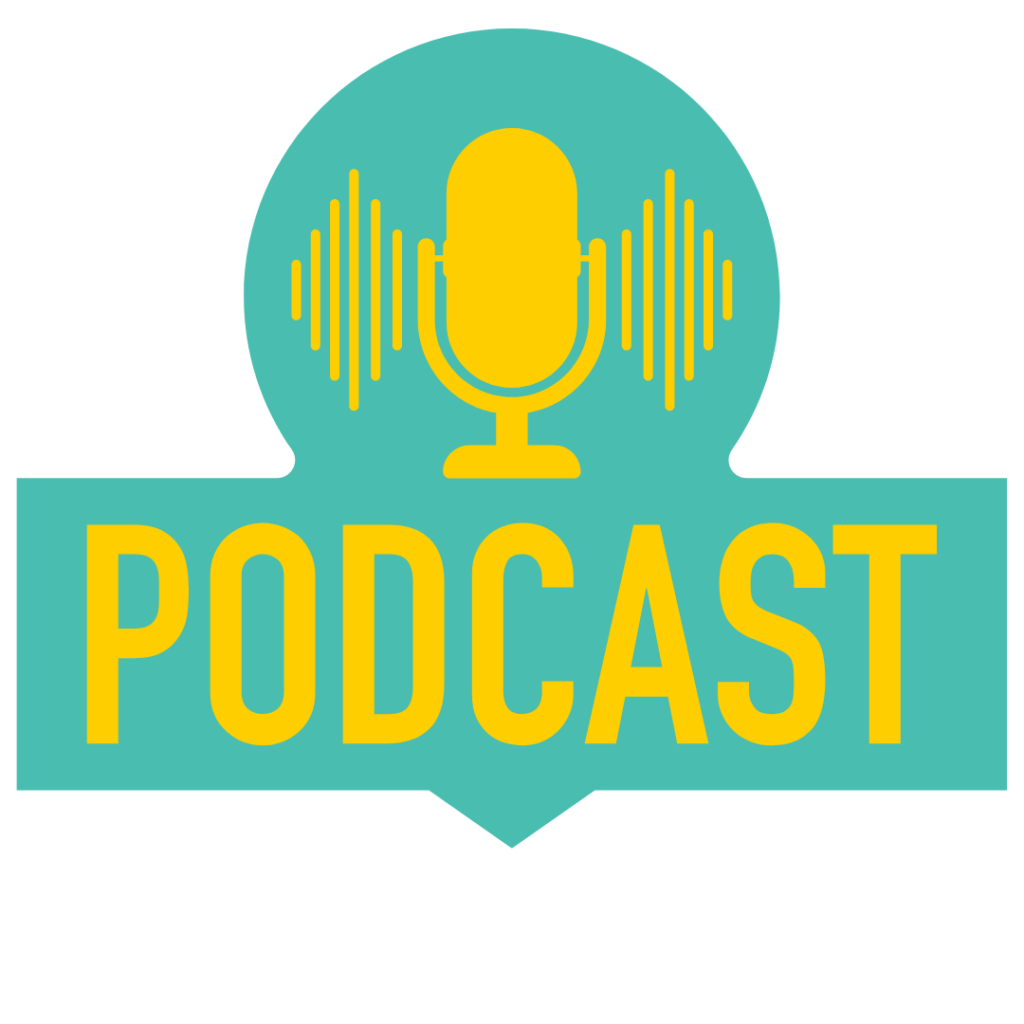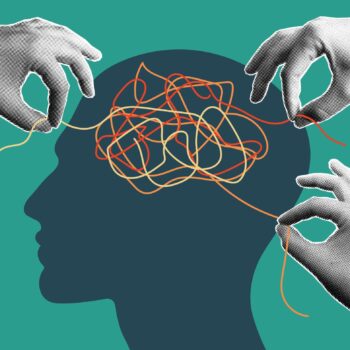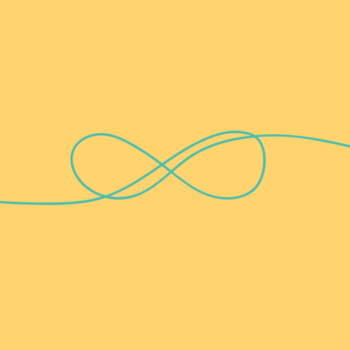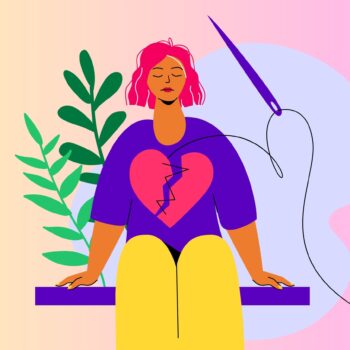What Are You Doing Here?
/ General : Litsa Williams
The What's Your Grief Podcast: grief support for those who like to listen.

In this grief podcast, Eleanor Haley, MS and Litsa Williams, MA, LCSW-C, the mental health professionals behind the website and book 'What's Your Grief', leave no stone unturned in demystifying the complicated and messy world of living life after loss. One digestible topic at a time, Haley and Williams distill topics ranging from grief theory to coping. Grief is sad and confusing, but your grief support doesn't have to be. You can listen here by using the player above or listen and subscribe wherever you get your podcasts.
Below we have provided a transcript of the episode.
Episode Transcript
Hey Litsa. How are you today?
I'm doing all right. How are you?
I'm good. I guess I didn't say the thing I usually say first. Welcome back to another episode of the What's Your Grief Podcast. I assume you know where you are, if you click on this podcast.
Oh I thought you were talking to me. And I was like...
Oh no, do you know where you are right now?
I do know where I am? I'm, I am alert and oriented times three, times four. How many ways are you supposed to be alert and oriented I forget.
Now I'm gonna have to Google that.
But yep I'm here I know that I'm with you on the podcast. I'm feeling confident.
Okay. All right. Good. Well, that's step one. Check. So for today, we normally come to you with a really brilliant and insightful podcast topic. And I wouldn't call it brilliant and insightful, it's more like a question what we want to talk about today is a question for our listeners about the podcast, right?
Yeah. I think it's the question. I mean, I think it points to the question that we have been asking each other which is What do people want from this podcast? Like, what are we doing? What are we doing here?
Yeah. I'll give you a little context to how we arrived here today. So we were talking about what we wanted to talk about today, right. And I think over the history of this podcast, which dates back like pretty far actually. We've taken a lot of different approaches. And we're not saying we're going to like change up our approach or anything necessarily but we were just kind of like wondering which of the types of approaches we've taken are the ones that people want to hear. And granted like different listeners want to hear different things, but I think when we started this podcast we're like all right we got to be really informative. We got to dive into certain topics and explain them and help listeners walk away with like a good understanding of a new concept or idea or way of thinking about things. Would you agree that that's kind of where we started?
Yeah, yeah. Or if not that, like some some tips for approaching things that are hard or for, you know, that they can, like, really put into practice.
Right. Like, take, like, constructive takeaways, right?
Yes, yes, yes.
And I think, then you know we had a little bit of a chapter where we were more in the middle. We wanted to talk about some of, like, what's going on in the world, baby pop culture type of things, like, grief and movies and TV, and maybe some more conversational stuff, but still very heavy on the takeaways. And I feel like where we've ended up recently is just a lot more kind of conversational stuff about, I feel like it's getting a little more abstract in a way. Less about the takeaways and informing people, though we do try and do that stuff, kind of like psycho education stuff. But I do feel like lately we've done a lot of more conversational type of podcasts, where we just talk about how we are thinking about things related to grief. Maybe themes that we've seen come up, maybe things that are happening around us and a lot of times about just our own grief experiences.
Yes. Yeah. I think that definitely cover and the winter. We've talked a lot about the winter. Yes. I think that that's been a lot. It's like been more of what are the things that we've been thinking about personally with intersections of, personally and professionally. But I think that has been a big piece of it. It has felt a little bit more abstract lately and maybe a little less, yeah, less worried about do we have to have concrete takeaways for people to walk away from the episode with and...
Yeah.
...a little bit.
Right. Which so and that leads us to where we are today. Because we were talking about the types of things that we could talk about. And you know Litsa and I, we talk a lot and we sometimes, we go on rants about certain things, you know. Sometimes we just have conversations about trying to understand different ways of thinking, about grief and concepts things like that. And so we were like what do people actually want to get from this? Like, what are our listeners really interested in? Because as I was saying to you Litsa, like, I think lately a lot of the podcasts that I listen to, I kind of just want to hear people talk, who I'm interested in hearing talk. And sometimes I want to hear them, kind of like, say things that, say things out loud that I've been thinking, or like kind of helping me to like reformulate further an opinion or maybe even just echoing my opinion so I know I'm like not the only one thinking it. To be like totally transparent I'm talking about podcasts right now not like grief support mental health type of learning, because I've been listening to so many pop culture podcasts. I am fully immersed in the Vanderpump Rules Scandal. I've listened to like 12 podcasts about it, so full disclosure there.
Meanwhile I have absolutely no idea what you're even referencing right now, so clearly I'm wow being a different podcast universe.
You, where have you been? It's like you're...
Under a rock, I'm under a rock I guess.
Well I, I tried to explain it to my husband last night as we were watching Vanderpump Rules and I'm like never mind, I can't this is too, there's so many podcasts. If you want to get up to speed, there are, so I'll send you some links.
Okay send you some links. You can get caught up on your commute.
I promise you plenty of our listeners know exactly what I'm talking about right now anybody who watches Bravo knows exactly what I'm talking about right now. So anyways, that's how I feel about podcasts. Now, (with) with regards to like grief support, mental health stuff, it's a little bit different but I want to put (put) it to you. What do you love to get out of podcasts or do you have, I know you listen to more podcasts than I do so maybe you have a lot of different objectives that you want to hit.
I do. I do think I have a lot of different objectives. And I think that interestingly part of the reason I struggle, or why I've always felt like having takeaways felt important, or I don't know, something like that, is that for a long time, I, the idea that anybody would just come onto this podcast to want to listen to us, like randomly chat about something like...
Yeah.
that feels like very hard for me to imagine that that's a thing...
Yeah. As I was saying that that's something I like in podcasts I was thinking in my head but who would want to listen to us?
Well, right, no, (that's exactly) that's exactly what I was thinking. Because I do think that one of the things that I really do love about podcasts ,there's a number of podcasts I like that are a format of just, you know, (two) two hosts who are taught, or two or more different hosts who are talking to each other, and what I love is also, yeah, just listening to them talk about whatever sometimes. I like the familiarity of it and I know that that's like weird, but I do think it's maybe slightly a product of the fact that I live alone and I listen to podcasts lot. Part of the reason I don't know the Bravo Scandals, like, I don't have cable tell, like, I don't have Bravo. And so I feel not that I don't watch TV, you know, I love some TV but (I) I watch mostly like specific Netflix type of things. And so I do listen to podcasts a lot. And (I) I like the familiarity of like tune in and I'm like oh I don't know these people, but I know these people and they're just talking about stuff they're interested in talking about and I'm interested in hearing them talk about that so I do think that that serves a big purpose for podcasts for me. I also love a form of podcast that will never be what we do which is like a storytelling podcast. Like, I love like deep dive storytelling podcasts, like you know, heavyweight or ones that are really kind of getting, yeah, into people and, yeah, highly produced storytelling podcasts, that's never going to be us. So we don't have to worry about that. But, yeah, that's kind of what hot.
Yeah. Podcasts serve for me...
And I do listen to informational podcasts too. So I should say that, like, I do listen to certain podcasts to, like, I listen to it, there's a financial podcast that I always listen to that I find helpful for like certain things where I'm like wow I really don't know anything about this topic, can, is there somebody doing a podcast that can help me break it down? Interestingly, I don't listen to, I listen to very few grief and mental health podcasts. I think I struggle with them. And so I think that's part of also what makes me unsure of why people listen to our podcast because (I) you know, it's like you can't assess your own thing very accurately. And then when I listen to other grief podcasts, I'm like, this isn't, and like some of them are wonderful like I appreciate that the content is wonderful and helpful but, like, (it doesn't) it doesn't do it for me in the way that other podcasts do. And maybe that's just because it's like I'm doing grief things all the time so...
Yeah.
Yeah. I don't know it's hard to say.
I'm the same way. I think part of it is definitely that thing, where it's like podcasts are sort of so you can like tune out while you're like doing the dishes or you know whatever it is in the car. And grief is your work, right, and I can imagine people who are grieving often feel the same way like oh I can't take a grief podcast right now because I'm spending so much time, like, just focused on my own grief stuff it's hard for me to listen to this right right now. So I can imagine where that would be true for a lot of people like if it's your, if it's something that's consuming your (your) everyday, it's hard to then have it playing when it's like your tune out time. So (I) I totally could see that totally good.
Well, and that's part of the thing about this podcast that (I) I work that (I) I wonder / worry about like recently I feel like more people have sent kind messages about the podcast lately than ever. And interestingly, it is a time where I feel a little bit more like well, I don't know, like we're not giving them takeaways does somebody really who's grieving themselves really want to tune in to listen to two people musing about grief? I don't know that feels, I feel unsure, but yet also, I'm like well people are sending nice messages and, that doesn't I, that's interesting.
I do think that they're, for me, so I'm thinking about where would what I want from grief support meet a podcast. And I do think like learning about a new thing is always my go-to. I think that you and I are similar in that way like we want to learn new things about grief a lot like and about some other concepts that are related to maybe psychology, you know, stuff like that. So, I do think that that is one thing, but I think if it's not that, I do think listening to a conversation that would help me to really formulate how I feel or how I look at my own experience is something that would resonate with me (if I) if I was listening to those people talk. That's like a big hurdle there, right. And so I think those are the things like when you're talking about your own grief experience and your relationship with grief, I think sometimes just having new perspectives can be helpful. So that's kind of where I would see like an overlap being, for me, if I you know in terms of, like, what I would want to kind of consume.
Yeah. That's interesting. Because you know, one of the things that I've, that we've done some episodes on lately and that we've always done over time just sporadically here and there is episodes that are when people listen or send us questions...
Yeah.
...and then we've done things or, you know, answering questions and that's an interesting space because sometimes if it's we get questions that are so specific, and occasionally I'll feel like wow this is, okay, like, is this, should we record about this when it's such a specific thing that it's only going to apply to like this super small subset of people, of listeners? But as you were describing that it's interesting because I think sometimes even when we're talking about a situation that might feel very specific and limited to someone grieving, I'm thinking of some other podcasts that I listen to that take that format where it's responding to something from a reader and oftentimes even if you don't relate to it at all there is still something that they're talking about that is relevant to you and that you pull back to your own experience and that helps you to think about and clarify something for yourself, and so I do wonder if that, you know, one of my questions is like do people like that, like, us responding directly to reader or listener questions? Or does it feel like oh now I have to listen to some other other griever who's really whose experience has nothing to do with mine. I don't know.
I could see it going either way. Like, and again it could depend on the day for you you know, but I could see it being like oh I definitely want to listen to this or I want to skip this topic. I could see that I do that all the time.
Yeah.
So I could see it going either way. But yeah, I think that questions are a good way just to, like, know other people are going through some of the similar things or very different things in this experience you're talking about, like, how to approach those different things. I think you can find insight from even questions that seem different than your own experience, but also of course when they are the same as your experience so and we are always open to those types of sessions. Simple sessions
Oh yeah.
Really taking it to mental health and then taking it to the mental health place.
So I think the other one that we don't do and that I don't gravitate towards, when you talked about not listening to other podcasts is the interview format.
Yeah.
And we do get a lot of people messaging us about being guests. And I am curious to know if our listeners would want that format not necessarily 100% of the time but would be interested. Litsa and I have talked about this a lot and I think that we both agree that if we were to do a guest route, it would more so, I think correct me if you disagree now, be that we would have a topic that we would all talk about less so than us just interviewing a person about their experience.
Yes. I think definitely like (I) I also, you know, don't get me wrong, there is an interview format that I like, right. It's like Fresh Air with Terry Gross interviewing someone famous. It's not, like, I like the very particular type of interview format and I don't like it's not something that I feel like for us is that I'm interested in doing in this space, but I do think that there's like lots of amazing people who we know or don't know who are also interested in grief who, you know, have thoughts about grief who've done things in this space that are both like and not like what we do and I do love the idea of being able to maybe talk with people sometimes like literally just have them join in for the conversation. So yeah we've kind of taught like that's, that's the idea that I think has resonated the most. I think the other thing that's hard about, you know, the interview format like we do, people reach out to us so often about this. And I can't criticize this format because obviously we put out a book last year and we went on other people's podcasts to talk about it. But one of the things that's hard is that oftentimes, you know when people pitch to be interviewed on your podcast, it's like there's a very, it almost limits what the conversation is going to have to be about because they have a reason like oh they've just made a documentary or they have a book out or they you know it's something like very targeted and specific so then all of a sudden it defines kind of what the episode is going to be about. It doesn't become what feels like it would resonate but most with our readers or I mean our listeners got, it's so hard that in many situations we have readers and in some situations we have listeners. You know, I think that that is the piece of it that I don't love, like I love the idea of oh this is an interesting person who's also thinking about grief, like, let's just talk but I'm not, like, let's have to narrow focus on whatever it is that they happened to...
Yeah.
...to have done something about.
Exactly. And we're not (we're not) like seasoned interviewers. We're not able to read people's books in order to interview them thoughtfully so I think that's that's part of it for us as well.
Yeah. I know we don't have time and that's part of it it's like you get these requests and it's like oh this looks interesting, you know, maybe but it's only a fraction of the things that we're able to review in terms of interviews or (or) you know movies or shows or whatever. I do, sort of, miss on an unrelated note or are slightly more pop culture episodes. We haven't done one of those in a while.
I know we can, because there's some stuff out there that I think we could watch shrinking. We can definitely do that in the future.
Yeah.
Well, what if we created a little survey (and) and put it in the notes.
Yeah. Yeah.
And so we will keep it really simple where we, I think, maybe we could have, like and, you don't have to select one, you know, we (we) want to hear just like where people's preferences lie (for) for, you know, podcasts like this in general. I think one of them would be, you know, just that psycho-educational stuff like getting we, I want the takeaways give me the takeaways. One would be kind of like listening to conversations about concepts and thoughts, I don't know how we would frame that, but you know what we talked about that. I think one could be like the question and answer format, could be having guest hosts and see where people say their interests lie. Because in the end, like, we want you all to get something from this.
Yeah.
And like you said, I think it's hard for us to really assess what is helpful to people, you know. And we full disclosure, like, we hope you leave us good reviews but we don't read the podcast reviews.
No, we were already hurt so deeply by podcast reviews like our plant that we just cut ourselves off from listening to them because I know I have vocal fry and you don't need to tell me in a review.
The funny thing about the podcast reviews is that, well, like we mentioned this recently, we started this podcast I think in 20, did we say 2014? And it, it's never been like, I guess, rocket science to create a podcast but at the time it was harder. It was a lot harder. And so our setup, our situation, it was a lot more rudimentary and so we have a lot of I think reviews from that time that were this production (is) is bad which...
Yeah.
...it definitely was. And it's not exactly like stellar now, but podcasting has become a lot easier to be passable, right. And I think our standards for podcasts have changed a little bit, like, at the time I think the gold standard was like cereal, right. We're never gonna be cereal you know, and so I do think that things have changed a little bit but we we keep moving forward with the reviews that were left in 2014 and I have definitely been tempted to be like let's just start over.
No, it's so true. Like, I feel so sad I'm like oh like it looks like our podcast is not very good because those reviews from 2014 and how about our sound quality was like dominate...
I'm sure that's not the only reason anybody ever left us a negative review. That's okay.
But those are the ones that were like the one star, like, it was just the like the really mean ones that took the average down. So yeah, we just did the smart thing for our own mental health and well-being which is that we stopped reading our reviews because otherwise we would have had to stop recording this podcast.
Unfortunately, I think that, that's the thing, where if you avoid the thing that's going to be painful, you cut yourself off from potentially getting the benefit of somebody who might have left you a nice positive review, but I'm sorry are just like our (our) self-esteem cannot handle this.
Oh, but we really appreciate when you all send a nice message. No, it does (it does) and make a big difference. And that's part of, yeah, why we just want to know more. And we'll (we'll) definitely put like a comment box on that survey for a few of suggestions of topics things you would love to hear us talk about whether that just be between each other or with somebody else. And if you have any questions we'll put that in there. So...
Yeah. Please.
Well, I was just gonna stay. How about we'll also maybe put an optional space in there where if you it'll be an anonymous survey but if you want to put your information in there we'll make it a, we'll make it a contest. We'll give a copy of our book. I'll do a drawing. Right? Yes.
Yeah. And if you already have your book we'll find some other way to make you happy.
We'll give you a membership to our community.
And how about both, let's just give them both.
Or both. Yes. We'll do both. And you can always re-gift the book.
But not the community. Well I guess you could. You could re-gift it.
You can re-give the community. Yeah, we'll do yes, we'll say a year in the community.
Yeah. All right, good idea.
All right, there we there we go. So if you needed any more incentives, there it is.
All right. Wow, thank you for sticking with us through this conversation about the podcast. It's very meta podcast about the podcast. Is, (I) I never know if I'm using the word meta right?
That's it. Yeah, okay. That's better.
And we do hope that you will fill out the survey. Again it's anonymous but if you leave your information, we'll give you instructions how to give us your information and we will enter it into a drawing. Let's say we'll leave it open for maybe a couple weeks.
Let's see I'll pick a date right now. How about until March the 25th?
Sounds good. All right.
All right.
All right. Bye everybody.
Bye everyone.
We wrote a book!
After writing online articles for What’s Your Grief
for over a decade, we finally wrote a tangible,
real-life book!
What’s Your Grief? Lists to Help you Through Any Loss is for people experiencing any type of loss. This book discusses some of the most common grief experiences and breaks down psychological concepts to help you understand your thoughts and emotions. It also shares useful coping tools, and helps the reader reflect on their unique relationship with grief and loss.
You can find What’s Your Grief? Lists to Help you Through Any Loss wherever you buy books:




